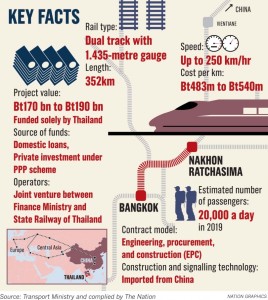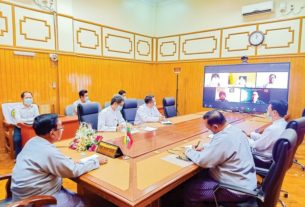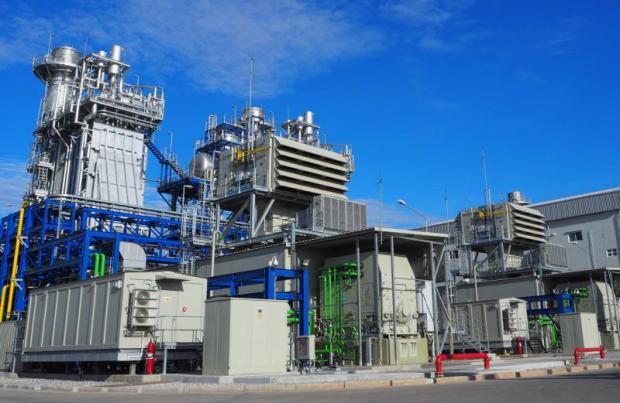Experts question economic feasibility as work on a double-track railway is already under way on the same route.
THE GOVERNMENT should call an international bid for the Bangkok-Nakhon Ratchasima high-speed-rail project, as it is no longer a joint venture with China, according to transport experts.
Prime Minister Prayut Chan-o-cha has said Thailand will invest wholly in the project after a joint-venture model proposed with China was not mutually acceptable.
Sompong Sirisoponsilp, associate professor at Chulalongkorn University’s civil engineering department, who specialises in transport engineering, said: “I have two questions. First, isn’t this high-speed-rail project redundant, with the double-track railway project under way? And second, why doesn’t the government call a bid” if it’s going to be the sole investor in this project?
Pramual Suteecharuwat, assistant professor at the university’s department of industrial engineering, also said the country would get the best possible deal if the government called open bids.
Samart Ratchapolasit, a former deputy governor of Bangkok, however, thinks differently. He said the government must ensure that Thailand gets a better deal from China on a government-to-government basis rather than holding an international bid.
Academics expressed concern that the 352-kilometre, estimated Bt170-billion high-speed-rail project would become redundant as the State Railway of Thailand is building a double-track railway on the same route.
The government argued that the high-speed-rail project would travel at about 250km/h compared with 100-120km/h that would be clocked by the normal train service using the new double track.
“Why doesn’t the government spend money to implement other projects such as irrigation, or those related to education, which are in need, rather than spending the money on this high-speed-rail project?” Sompong asked.
Pramual voiced the same opinion, saying that if government has a limited budget, it should utilise it for projects where the majority of people could reap the most benefits, such as improving the mass-transit system in Bangkok or expanding the 1-metre-gauge dual-track railways in other parts of the country.
“Now, we’re also implementing the 1-metre-gauge dual-track railway, linking Bangkok with Nakhon Ratchasima and Nong Khai. We can also develop commercial areas around these stations,” Pramual said, adding that it might not be economically worthwhile to spend a lot of public money to serve only a small number of passengers, estimated to be only around 20,000 per day for the Bangkok-Nakhon Ratchasima route.
Sompong also doubted if the high-speed-rail project would help speed up urbanisation if the route were identical to the existing 1-metre-gauge railway, while low-income people would not benefit because of the high ticket prices.
Transport Minister Arkhom Termpittayapaisith said yesterday that the government would use China’s high-speed technology in accordance with an earlier memorandum of understanding signed by the two countries after Prayut decided that Thailand would be the sole investor in the project instead of forming a joint venture with China.
Arkhom said China would be hired to develop the Bangkok-Nakhon Ratchasima train project on an engineering, procurement and construction contract.
“Since the previous 70:30 joint investment ratio proposed by Thailand was not acceptable to China, we decided to invest all by ourselves,” Arkhom said.
China estimates the Bangkok-Nakhon Ratchasima section would cost Bt190 billion, Bt20 billion higher than the Thai estimate. Prayut has asked his Chinese counterpart to review the figures.
Arkhom said the latest investment-model change would further delay the start of construction by another four to five months from May this year as scheduled. The government plans a joint venture with the private sector to operate the project.
Arkhom said Thai and Chinese officials would hold the 10th round of negotiations next month to discuss the new investment model. He said the Thai side would ask China to lower its interest rate on loans to 2 per cent from 2.5 per cent per annum.
Construction on the high-speed train project is expected to start around September. He said the trains would mainly be for passenger transport and a public-private partnership would be awarded a contract to operate the service.
The double-track railways will be used to link with Laos and other neighbouring countries, he said.
Source: http://www.nationmultimedia.com/politics/Invite-bids-for-train-project-30282542.html



